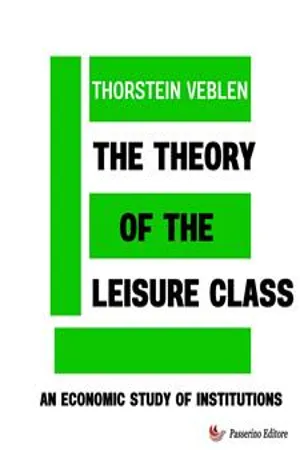
- English
- ePUB (mobile friendly)
- Available on iOS & Android
About this book
The Theory of the Leisure Class -An Economic Study of Institutions (1899), by Thorstein Veblen, is a treatise of economics and sociology, and a critique of conspicuous consumption as a function of social class and of consumerism, which are social activities derived from the social stratification of people and the division of labor; the social institutions of the feudal period (9th–15th c.) that have continued to the modern era. Thorstein Bunde Veblen (July 30, 1857 – August 3, 1929) was an American economist and sociologist who, during his lifetime, emerged as a well-known critic of capitalism. In his best-known book, The Theory of the Leisure Class (1899), Veblen coined the concepts of conspicuous consumption and conspicuous leisure. Historians of economics regard Veblen as the founding father of the institutional economics school. Contemporary economists still theorize Veblen's distinction between "institutions" and "technology", known as the Veblenian dichotomy.
Frequently asked questions
- Essential is ideal for learners and professionals who enjoy exploring a wide range of subjects. Access the Essential Library with 800,000+ trusted titles and best-sellers across business, personal growth, and the humanities. Includes unlimited reading time and Standard Read Aloud voice.
- Complete: Perfect for advanced learners and researchers needing full, unrestricted access. Unlock 1.4M+ books across hundreds of subjects, including academic and specialized titles. The Complete Plan also includes advanced features like Premium Read Aloud and Research Assistant.
Please note we cannot support devices running on iOS 13 and Android 7 or earlier. Learn more about using the app.
Information
Table of contents
- Cover
- The Theory of the Leisure Class
- Table of contents
- Introductory
- Pecuniary Emulation
- Conspicuous Leisure
- Conspicuous Consumption
- The Pecuniary Standard of Living
- Pecuniary Canons of Taste
- Dress as an Expression of the Pecuniary Culture
- Industrial Exemption and Conservatism
- The Conservation of Archaic Traits
- Modern Survivals of Prowess
- The Belief in Luck
- Devout Observances
- Survivals of the Non-Invidious Interests
- The Higher Learning as an Expression of the Pecuniary Culture